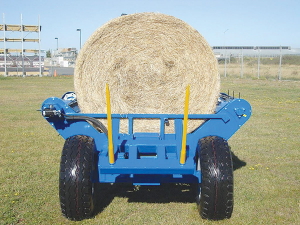Palmerston North's McIntosh has a reputation for building feed equipment that’s of robust construction, features clever engineering and a has long working life.
Its Double Bale Feeder builds on this reputation and offers the ability to deal with round or square bales.
From a practical point of view, one of the worst traits of a ‘normal’ bale feeder is the tendency to run over the feed it has just delivered. In the case of the McIntosh Double Bale Feeder, a 315mm overhang from the tyre edge to the outside of the bale feeder frame, means that delivered feed is never run over and pushed into the ground and wasted. This represents a huge cost saving – especially when operating in wet conditions.
The construction layout sees two box sections running through the bale cradle to increase overall strength, while also lowering the loading height and the centre of gravity. This gives the machine greater stability and makes it safer to use on hillsides or sloping ground.
A choice of wheel settings enhances safe operation on difficult terrain, as well as the option of fitting larger tyres. Standard equipment features 11.5 x 15.3 tyres, a detail that helps to reduce rolling resistance, while making towing easier in poor conditions. There is the option of increasing the footprint by fitting 400/60x15.5 tyres.
At the rear, an overdimensioned lifting arm can deal with the heaviest bales, while also offering the ability to carry a second bale to the feeding area. The design features twin lift rams, which gently lower the bale onto the unrolling cradle and helps prevent damage to the feeder bars.
The unrolling cradle uses a zinc-plated, 12,000lb-rated chain, with slow running shafts utilising bronze bushes for resistance to silage juice and a greater service life. Unloading slats are manufactured from 8mm steel with integral teeth to promote bale rotation by increasing the contact area, while in the cradle, aggression pins restrict bale movement to encourage the teeth to pull the bale apart.
The large hydraulic motor comes with a 1 ¼ shaft and heavy-duty key. The machine includes a rubbish bin and a chequer- plated platform on the drawbar a-frame to allow the user to safely remove the film and net wrap. Practical options include a third central tine for the rear lifting forks – said to be useful for dealing with soft or mis-shaped bales. Meanwhile, for those handling square bales, lateral extensions, each carrying an extra tine, ensure positive lifting onto the cradle.



















